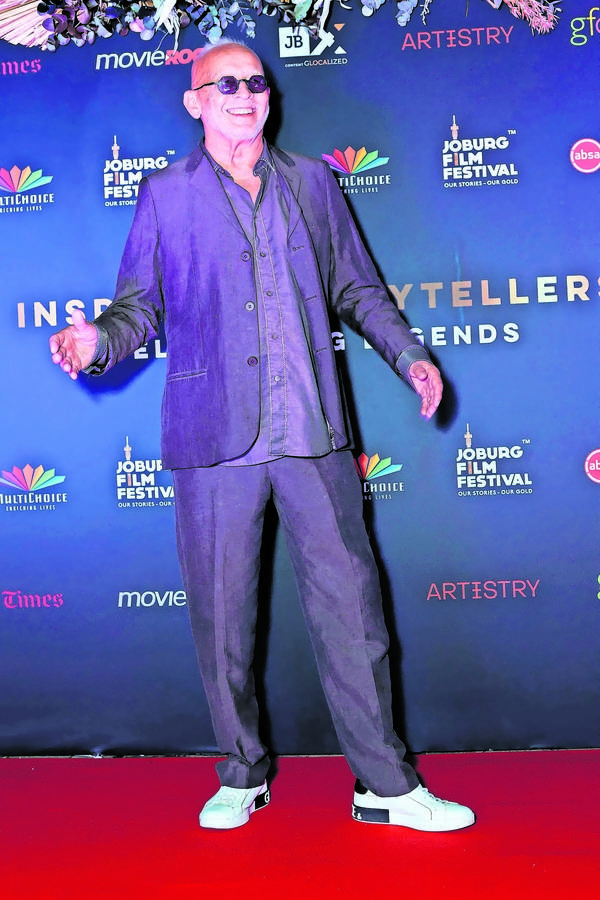A scene from the movie
There are times when the film gods offer quality viewing that demand attention. It was no surprise when such a film, Death of a Whistleblower, won Best African Film at the Johannesburg Film Festival last weekend.
In this South African political thriller, investigative reporter Luyanda Masinda (Noxolo Dlamini) is left shell-shocked when her one-night lover, renowned editor Stanley Galloway (Rob van Vuuren), is hijacked and killed in front of her on a busy Joburg street.
Stanley’s death is no random act though — callous unknown forces in high places were the ones who hit the kill button.
Luyanda eventually discovers that Stanley had been receiving explosive information from a secret military whistleblower, Albert Loots (Irshaad Ally).
What follows is a jigsaw puzzle of different timelines, random photos and multiple tabs on a laptop screen, of a sinister scheme involving biological warfare across Africa and the Middle East.
As an investigative journalist, it is Luyanda’s task to track down the parties who are at the centre of this intricate plot, while seeking justice for her colleague.
 First-class viewing: Death of a Whistleblower director Ian Gabriel
First-class viewing: Death of a Whistleblower director Ian Gabriel
Dlamini’s portrayal of Luyanda is evocative of the fire seen in her roles in Silverton Siege and The Republic, where she is also in pursuit of truth and justice.
Whistleblowers are associated with a heightened sense of morality and justice. In an era of censorship in many parts of the world, when whistleblowers and journalists are frequently murdered, how far does one go in “telling the truth”?
In his book Crisis of Conscience, Tom Mueller argues that whistleblowers force us to confront fundamental questions about the balance between free speech and state secrecy and between individual morality and corporate power.
But instead of being celebrated as heroes, whistleblowers are often vilified as snitches or traitors.
This is how private security owner Martin Bezuidenhout (Deon Coetzee) and public official Thuli Yiza (S’Thandiwe Kgoroge) come to see the likes of Stanley, Luyanda and Albert as troublemakers.
As such, the fact that the film questions the ability of the Truth and Reconciliation Commission to heal past wounds by exposing the truth is telling. The film adds to the debate that the commission was merely a facade to appease the incoming black government and its electorate.
The disenfranchised — the majority — were given political freedom but the oppressors — a minority — remained undisrupted, while clutching the economic pot at the end of the rainbow.
The rationale of capitalism for democracy supposedly meant to benefit the majority is a neoliberal project to maintain the status quo.
The film further shows that the secret deals between private security companies and politicians are in fact plots leading to state capture.
The film’s intention is not only to salute real-life whistleblowers, such as Moss Phakoe, Sindiso Magaqa and Babita Deokaran (who are mentioned in the end credits), it is also a salute to investigative journalists who search for the truth beyond the scoop.
It is this bravery that whistleblower, academic and anti-corruption advocate Athol Williams encourages. In his explosive book Deep Collusion, Williams reasons that, as a country, we need to move from the era of the bully to the era of the brave. Politicians and legislators, he argues, must stand up to bullies “because I cannot see us moving out of this world of corruption when we all live in fear”. He concludes that courageous people such as whistleblowers act not just for themselves but in the interests of our country.
Plots involving corrupt politicians and big businesses make for thrilling viewing. It’s great to see intricate storylines such as this in local films.
 Noxolo Dlamini, who plays investigative reporter Luyanda Masinda
Noxolo Dlamini, who plays investigative reporter Luyanda Masinda
Written by Louis Viljoen and Philip Roberts, Death of a Whistleblower is a testament to the brilliant writing and filmmaking talent in the country. Director Ian Gabriel, along with producers Joel Phiri and Tshepiso Sello, succeed in telling a riveting story.
There is little in the way of menacing scoring — or any of the other emotionally manipulative tactics often employed in local films and TV series — to sell us this thriller. Instead, the stellar cast, first-class cinematography, relevant themes and intriguing script keep the film moving.
Overall it is a squeezing of South African political history, post-apartheid issues and global politics into a two-litre bottle for us to quench our curiosity about our country.
Choking on truths and revelations might, sadly, be the result, instead of educating and calling to action. There is just too much to digest when one is unfamiliar with African and Middle Eastern politics, due to the film’s proximity to real events.
To some, it might require a second or even third watch with a notebook in hand. But, then again, if films don’t elicit critical thinking, what is the point of them?
Death of Whistleblower is streaming on Amazon Prime.